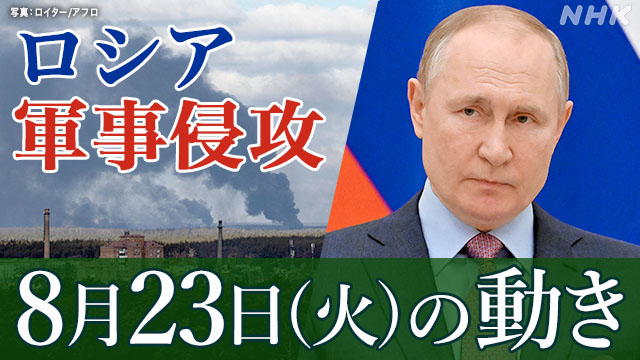Russia's military aggression against Ukraine continues.
Fighting between Russian and Ukrainian forces continues across Ukraine, forcing thousands of civilians to flee the country.
We will keep you updated on developments in the situation in Ukraine on the 23rd (Japan time), including the battle situation and the diplomacy of the countries concerned.
(There is a time difference of 6 hours between Japan and Ukraine and Moscow, Russia)
UN: At least 5,587 civilian deaths in Ukraine
The United Nations High Commissioner for Human Rights has announced that at least 5,587 civilians have died in Ukraine between 24 February and 21 August as the Russian military offensive began.
Of these, 362 are children.
By region,
▽ 3,317 deaths have been confirmed in the eastern Donetsk and Luhansk provinces, and
▽ 2,270 deaths have been confirmed in other regions such as the capital Kyiv and eastern Kharkiv provinces.
Many of the victims were caught in artillery and airstrikes and lost their lives.
In addition, 7,890 civilians were injured.
The United Nations High Commissioner for Human Rights said it could not accurately estimate the number of casualties in areas where intense fighting took place, and that the actual number is much higher than announced.
Half a year after the invasion, the impact on the global economy is serious
A prolonged Russian military invasion of Ukraine is feared to spur inflation and slow the global economy.
The IMF = International Monetary Fund forecasted the growth rate of the world economy this year (2022) to be 4.4% as of January, but since then, this forecast has been revised downward twice, and in July It was 3.2%, a decrease of 1.2 points compared to before the military invasion.
As for the reasons for the downward revision, the IMF cites that the military invasion has led to soaring energy and food prices, and that central banks in Europe and the United States are rapidly tightening monetary policy to curb inflation.
He also pointed to downside risks that could lead to a further decline in growth, such as a decline in oil exports from Russia and the suspension of natural gas supplies to Europe.
In addition, the World Bank also lowered the growth rate of the global economy to 2.9% as of June, 1.2 points compared to the forecast before the invasion, and the risk of "stagflation" in which prices rise and the economy slows down at the same time. are sounding the alarm that is occurring worldwide.
Crude oil prices have fallen to pre-invasion levels due to concerns about an economic slowdown, but natural gas prices have soared, and Russia's military invasion has had a serious impact on the world economy through inflation.
Half a year after the invasion, concerns about food crisis still persist
Six months after Russia's military invasion of Ukraine, fears of food shortages continue in Africa and the Middle East, which depend on grain imports from both countries.
Russia and Ukraine are major exporters of grain, and fears that exports will stagnate after the military invasion have led to soaring prices of wheat and other commodities.
The FAO = Food and Agriculture Organization of the United Nations compiled the "Food Price Index" based on international transaction prices of grains, etc., in March, the highest since the start of statistics, at more than 159 points, and then in June. The 150 point level continued until.
The index fell to 140.9 points in July after Russia and Ukraine agreed to resume exports of Ukrainian agricultural products mediated by Turkey and the United Nations, but remains relatively high.
According to the United Nations, by August 20, more than 650,000 tons of grain had been transported from the port of Odesa in southern Ukraine, but serious concerns over food crises still persist.
A report released in June by FAO and the United Nations WFP (World Food Program) said that serious hunger is expected to worsen in 20 countries, including Africa and the Middle East, through September.
Six of these countries, including Ethiopia, Nigeria and Afghanistan, have warned that up to 750,000 people could starve to death.
Former U.S. Secretary of Defense: U.S. and allies unite to support Ukraine
In an interview with NHK, Leon Panetta, who served as Secretary of Defense and Director of the CIA during the Obama administration, said in an interview with NHK, "The war in Ukraine is a turning point war. "It suggests a lot about what could happen to the democracy of the century."
He added, "The worst-case scenario that could happen now is that this war becomes a long war of attrition, because that's exactly what Mr. Putin wants. Mr. Putin wants the power of the United States and its allies to take over time." We are trying to weaken it by spending money on it, and we must not allow it."
"It is very important that the United States and its allies continue to support Ukraine by uniting strongly," he said. I showed the idea that I should keep calling.
“Putin initially thought he could invade Ukraine, capture the capital and overthrow the government within two days, but he failed to do so. "We expect Russia to lose in the coming years. Putin will ultimately be weakened by his decision to go to war in Ukraine."

